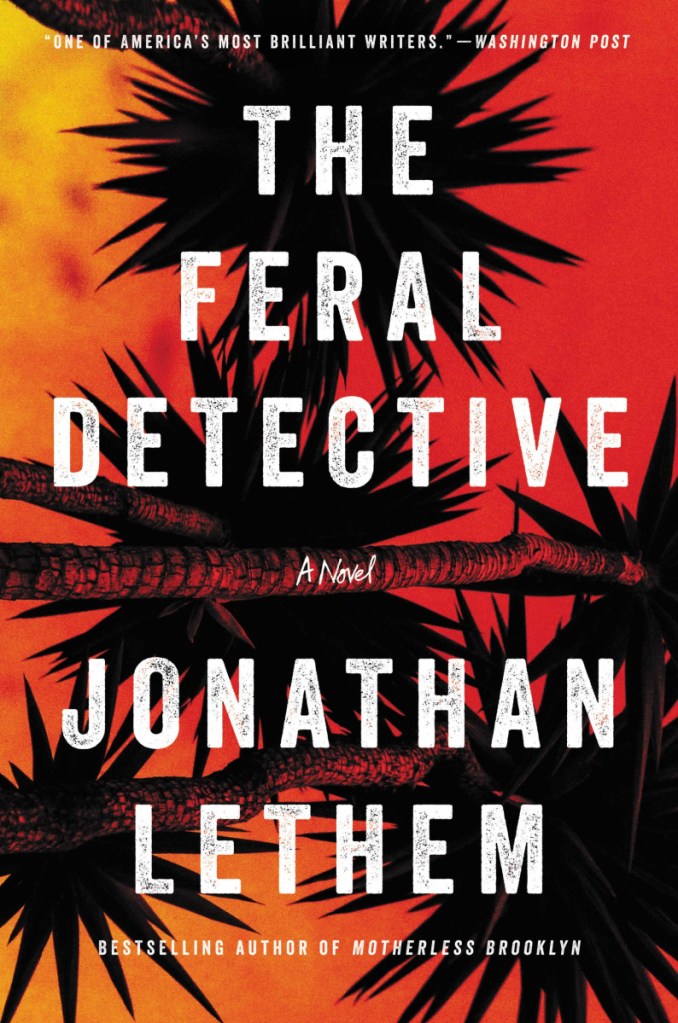With his eleventh novel, “The Feral Detective,” Jonathan Lethem seems to have returned to the detective story, his third in that genre. But the narrator of his latest novel isn’t a hard-boiled detective like the “private inquisitor” in “Gun, with Occasional Music,” or like the detective with Tourette’s syndrome in “Motherless Brooklyn.” No, this narrator is a 33-year-old woman named Phoebe Siegler, a New York liberal whose “mouth won’t quit.” Phoebe is so angry about the 2016 election of the “orange monster” that her story becomes the rarer detective-political allegory. If you’re a fan of Donald Trump, you are not going to like this book.

Jonathan Lethem
Phoebe quits her job as a “decorative editorial flunky” at The New York Times, and in January, just before the inauguration, goes west in search of her friend’s daughter Arabella Swados. Arabella, a fanatical fan of the singer-songwriter Leonard Cohen, has dropped out of Reed College in Oregon and has gone to California to find Cohen. He was rumored to be living in Los Angeles County on Mount Baldy with Buddhist mystics. It turns out Cohen has been living in “Los Angeles proper, among the Jews and pop stars.” But Cohen dies just before the election, and Arabella disappears and has been missing for three months, since sometime in September.
Phoebe tracks Arabella from Oregon to L.A., where the police offer little help in finding the missing 18-year-old. The cops, however, do direct Phoebe to a social worker who recommends that she contact Charles Heist, nicknamed “the feral detective.” She enlists Heist’s help. Heist is a 50-ish big-headed fellow with bushy eyebrows and sideburns. He wears a red leather cowboy jacket with white leather-trimmed vest pockets and cuffs like a uniform or an emblem. Instead of a bottle of Scotch and a gun, Lethem endows Heist with a sickly possum in his desk drawer, and a young, wild, rescued girl in his office. Phoebe calls Heist “attractive, with an undertow of disgust.” Naturally, she develops a yen for him.
The two set out in the area around Los Angeles called the Inland Empire, with its deserts and mountains, to find Arabella. Lethem must have had fun playing with character names and literary allusions. The name “Charles Heist” sounds suspiciously like “Jesus Christ,” and Phoebe is 33 years old, the age of any number of literary Christ figures (and considered by scholars the age Jesus may have been when he was crucified). Lethem, who divides his time between Brooklyn and Blue Hill, isn’t sure you’ll get the Christ-figure business, so he describes a minor character as “Christ-bearded” and another guy with “Jesus-y hair” so you make the connection. But it takes the both of them to create one Christ figure. “We might each have a separate fight and a separate fighter whose pain was our own,” Phoebe says, “yet this incoherence made us one thing together.” Together Charles Heist and Phoebe are one savior: they save Arabella and they save each other.
The two eventually come across desert people called Bears and Rabbits. The Bears are predominantly men – ex-cons and bikers – and a few female groupies; the Rabbits are generally females with some mostly mild-mannered males. They all began as hippies, one of the Rabbits says, and adds, “Humans are born polymorphous and free.” Some other shifty and dangerous folks are out there, too, motley off-the-grid misfits, kidnappers and human traffickers who’ve taken advantage of and even murdered runaways, abused children and teens caught up in cults. The Bears began as the “Bear-Killers,” whose original king was Howard Burkhardt. Now, they have a new, potential king, the crazy Solitary Love who claims to be an “Enduring Storm vet.” But Heist was born in the desert and lived in Viscera Springs for a few years. He’s part Bear, part Rabbit, and he eventually sets out to meet and challenge Love in a brawl-to-the-death for the title of Bear King that turns into a tag-team match.
Like any good detective story, there’s plenty of adventure, violence, some sex, and there’s that opossum, too. Everyone loves opossums, don’t they? But this allegory disguised as a detective story portrays political division in America – between rural and city folk, men and women, old and young. The characters are fleshed out as Bears and Rabbits with Heist as that middle-of-the-road creature with a foot in each tribe. As Phoebe and Heist search for Arabella, Phoebe imagines her mission is to “infiltrate and explicate” the Great Out There and to write a glorious op-ed piece for the Times or Harper’s about the “monster in the tower” and “insane (expletive) Trump supporters.” It’s an interesting story with lots of the usual Lethem touches, but it offers no easy or certain resolution to the dissension in the country. Still, to paraphrase Phoebe, this story trumps anything I possibly could say in a review. And to quote her, “I hate how that word is ruined, among so many other ruined things.”
Joseph Peschel, a freelance writer and critic in South Dakota, can be reached at joe@josephpeschel.com or through his blog at josephpeschel.com/HaveWords.
Copy the Story LinkSend questions/comments to the editors.



Success. Please wait for the page to reload. If the page does not reload within 5 seconds, please refresh the page.
Enter your email and password to access comments.
Hi, to comment on stories you must . This profile is in addition to your subscription and website login.
Already have a commenting profile? .
Invalid username/password.
Please check your email to confirm and complete your registration.
Only subscribers are eligible to post comments. Please subscribe or login first for digital access. Here’s why.
Use the form below to reset your password. When you've submitted your account email, we will send an email with a reset code.